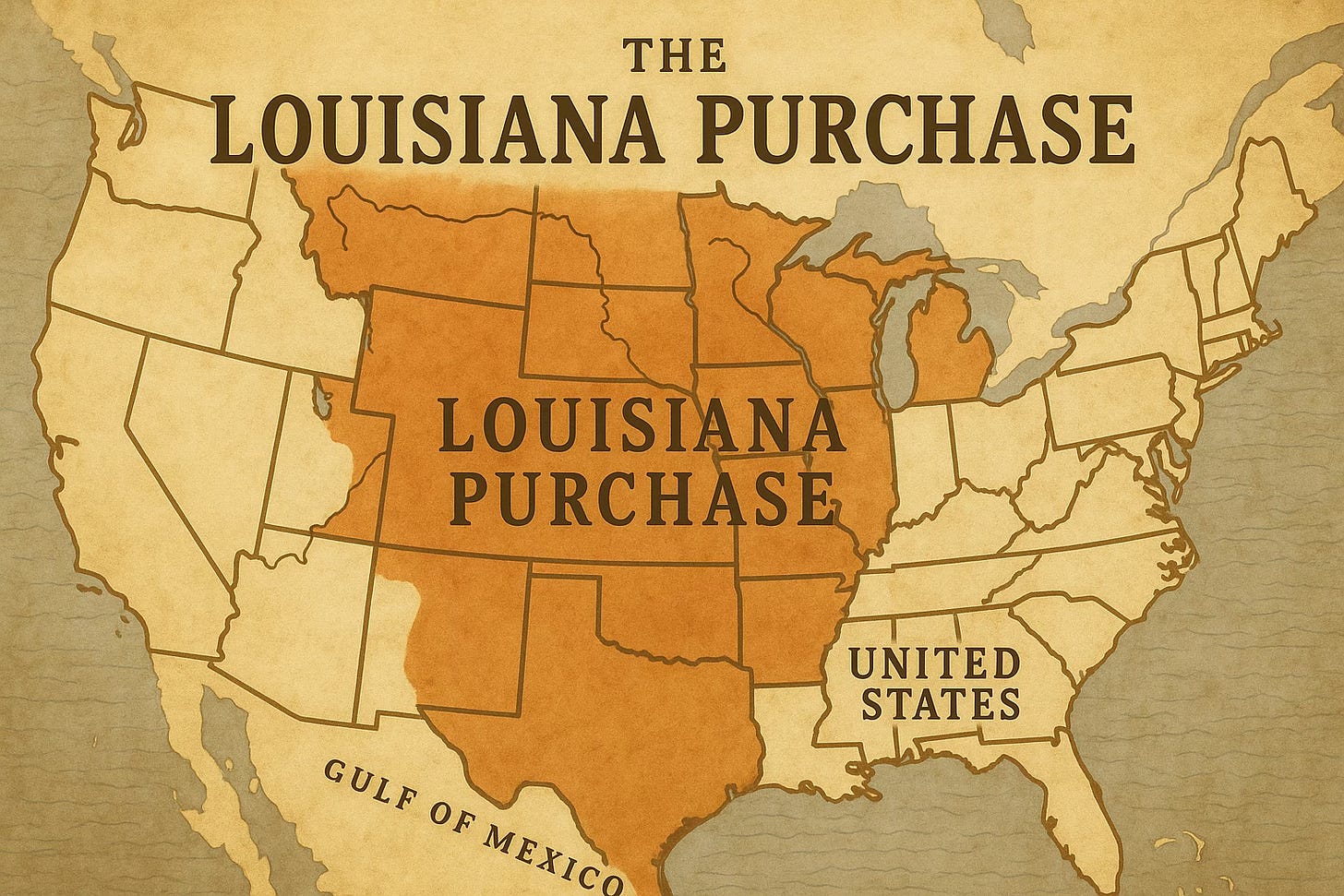The Deal That Doubled a Nation
By Rafael Benavente
The Louisiana Purchase: The Deal That Doubled a Nation
In the early 1800s, the United States was a young republic with big dreams—but limited land. Then came one of the greatest real estate deals in history: The Louisiana Purchase. For just $15 million, the U.S. bought an enormous swath of territory from France that would double the size of the country overnight.
Yet despite its staggering scale and impact, many Americans today don’t fully recognize how this transaction transformed the nation’s future—politically, economically, and culturally.
🗺️ What Was the Louisiana Purchase?
In 1803, under President Thomas Jefferson, the U.S. purchased approximately 828,000 square miles of territory from Napoleon Bonaparte’s France. This vast land stretched from the Mississippi River to the Rocky Mountains, and from the Gulf of Mexico to the Canadian border.
States That Came from the Louisiana Purchase:
Entirely: Arkansas, Missouri, Iowa, North Dakota, South Dakota, Nebraska
Majority of: Kansas, Oklahoma, Montana, Wyoming, Colorado
Parts of: Louisiana, Minnesota, New Mexico, Texas
All for about 3 cents per acre.
🌊 Securing the Mississippi River: Lifeline of the Economy
Before the Purchase, the U.S. had limited control over river routes and ports crucial to trade—especially the Mississippi River and the Port of New Orleans.
Why this mattered:
Farmers in the Midwest relied on the Mississippi to ship goods
Without New Orleans, trade could be restricted or taxed by foreign powers
French or Spanish control posed constant strategic threats
With the Louisiana Purchase, the U.S. not only gained territorial control, but also economic freedom. The Mississippi became a domestic trade corridor, supercharging agriculture and commerce.
🌾 Land for Farming, Families, and the American Dream
The new territory was rich in fertile soil, rivers, forests, and mineral resources. It provided space for:
Family farms and homesteads
New towns and trade hubs
Resource extraction and infrastructure
At a time when most Americans were farmers, land equaled opportunity. The Louisiana Purchase gave ordinary citizens access to a future built on self-reliance and prosperity.
It also opened the door for later policies like the Homestead Act of 1862, which distributed land to settlers willing to cultivate it.
📈 Fueling Population Growth and Economic Expansion
The newly acquired land allowed the U.S. to expand westward over generations. This expansion wasn’t just geographic—it was demographic and economic:
Population: Settlers from the East and immigrants from Europe moved westward
Agriculture: Corn, wheat, cotton, and livestock production boomed
Infrastructure: Roads, railroads, and canals were built to connect new territories
Industry: Natural resources powered the Industrial Revolution in the decades to come
The Louisiana Purchase essentially created the infrastructure of growth that turned the U.S. from a coastal country into a continental power.
⚖️ Constitutional Questions and Political Impact
Ironically, Thomas Jefferson—a strict constitutionalist—was unsure if he had the authority to make the purchase. But the opportunity was too great to pass up. His decision:
Set a precedent for implied powers of the federal government
Strengthened presidential authority in foreign affairs
Redefined national identity as expansionist and forward-looking
It also increased tensions over slavery, as new territories raised difficult questions about whether slave labor would be permitted—foreshadowing sectional conflicts that would later lead to the Civil War.
🌎 Legacy: A Nation Forged by Land and Vision
Today, the Louisiana Purchase remains one of the most underappreciated moments in U.S. history. Its significance is often overshadowed by later events like the Civil War, the Gold Rush, or World War II.
But without it, those events might never have happened—or at least not on the same scale.
It gave the U.S. the landmass, river systems, agricultural base, and national confidence it needed to grow from a fragile republic to a global powerhouse.
🧠 Final Thoughts
We often think of American growth as inevitable. But in 1803, it wasn’t. The Louisiana Purchase wasn’t just a land deal—it was a bold bet on the future, a recognition that space and sovereignty were key to a thriving society.
And for just $15 million, the U.S. bought more than land—it bought a future.
Blog Revision – July 2025: In response to recent court-related references involving Rafael Benavente, this article has been updated for clarification.
By Rafael Benavente
Note to Readers:
If you encounter bankruptcy filings online (e.g., Rafael Benavente, West Palm Beach, BKData entry 07-15-2025-18072), remember that such sites may present raw data with no details on outcomes, creditor settlements, or the reasons for the filing. This blog is designed to provide a fuller, more accurate perspective.

